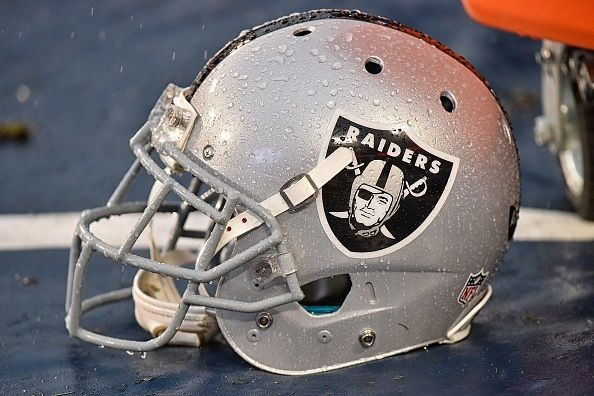NFL In Las Vegas: Why Athletes’ Problem Gambling Could Be An Issue
Even though it’s not on the official agenda, it’s the question on everybody’s mind at the NFL owners meetings this week: Could there really be a professional football franchise in Las Vegas?
The NFL has long opposed the idea of a Las Vegas franchise, but at the spring owners meetings in Charlotte, North Carolina, the Oakland Raiders’ potential move to Sin City is expected to be a main topic of discussion that’s not on the official schedule, according to Peter King of Sports Illustrated’s MMQB. Gambling has historically been taboo in the NFL, with officials even barring players from being in poker tournaments. There is a high rate of problem gambling among current and former athletes, research suggests, which means putting millionaire NFL players in the center of the wagering world may not be the best idea.
Trepidation about the NFL in Vegas is typically over tying the league — and the public image it cares so deeply about — to sports wagering. And there’s the added temptation of those directly involved in games to affect outcomes to collect on wagers.
The NFL has thus historically drifted as far away from gambling as possible. It opposed the idea of New England Patriots owner Robert Kraft leasing land in 2011 next to the team’s suburban Boston stadium for a $1 billion casino. The league in 2015 forced the cancellation of a fantasy football event at a non-casino property in Vegas since several players, including Dallas Cowboys star Tony Romo, were scheduled to attend. Later that year it refused to allow three players to participate in a $94 buy-in poker event.
At first, the NFL promoted silence on the possible Las Vegas move, but influential officials are now stepping out in favor of the idea as Raiders owner Mark Davis promised in April half a billion dollars for a new stadium in the city. NFL Commissioner Roger Goodell said on ESPN Radio in April that the league was evolving in its views on gambling. In addition, Cowboys owner Jerry Jones, who was a key player in ushering the Rams from St. Louis to Los Angeles, made waves this month by saying he wouldn’t be opposed to the Las Vegas move. The Patriots’ Robert Kraft, a powerful owner, soon after upped the ante by saying he would support the Raiders’ moving to Vegas.
But if the league has the well-being of its players in mind, there might be reason for concern about both the players who would relocate to the gambling capital of the U.S. and the rest of the league that would visit the city for away games.
The idea was hinted at in a blog post this week by Pro Football Talk’s Mike Florio, who was spurred to write the piece after hearing of the idea from Tom Curran of Comcast SportsNet New England. Florio wrote:
"Absent a change to the policy, this means that Raiders players would be able, when not working, to spend as much time as they want in casinos, wagering as much money as they desire. Which could result in Raiders players losing plenty of money and thus needing money and, in turn, becoming more tempted to, for example, provide inside information to gamblers for money."
If NFL wants to keep players out of casino owned properties, it also needs to tell teams it can't do deals w/casinos pic.twitter.com/XepAdjx7DK
— Darren Rovell (@darrenrovell) June 11, 2015
Sin City has, at times, been unkind to millionaire athletes. Perhaps most notably, former NBA star Charles Barkley said he lost at least $1 million at casinos dozens of times. Former Indianapolis Colts quarterback Art Schlichter is serving a 10-year prison sentence for running a scam after struggling with gambling addiction. MLB’s Pete Rose ended up banned from baseball for gambling on the sport.
Research has shown that athletes in particular can struggle with gambling. The NCAA looked into the issue and found in 2004 that student-athletes were twice as likely to gamble as nonathletes, and in 2002 a study found that athletes were twice as likely to be problem gamblers.
“Athletes are at high risk for sports gambling because of their competitive personalities, need for action and excitement, perception of social norms, and sense of entitlement,” wrote the National Council on Problem Gambling in a fact sheet.
And if college athletes are inclined to have issues with gambling, it likely carries over to professionals, especially highly competitive pros living in Las Vegas. An oft-cited paper published in the Sociology of Sport Journal in the mid-1990s suggested that athletes were drawn to gambling because of a “spill over” of competitive motivation. After studying undergraduate athletes, the paper “argued that overlapping motives exist for sport participation and for gambling.”

Players in Vegas will have increased access to that sort of release for competitiveness. And it can apparently build lasting habits. A study in UNLV Gaming Research & Review Journal found that former athletes were at risk for problem gambling. “Data obtained in the current study suggest that ‘retired’ athletes may be a segment of the athletic population which is the most susceptible to pathological gambling,” the authors wrote. These former athletes were particularly drawn to games that involved more skill like poker or sports wagering.
The lure of Vegas is strong for the NFL, as is the planned $1 billion stadium. Sporting News wrote this week a Las Vegas team is a lead pipe lock. The league is softening its hard stance against the city, but research shows it might be best for the NFL to look into protecting its players against the lures of Vegas, even while it chases them down.
© Copyright IBTimes 2024. All rights reserved.






















